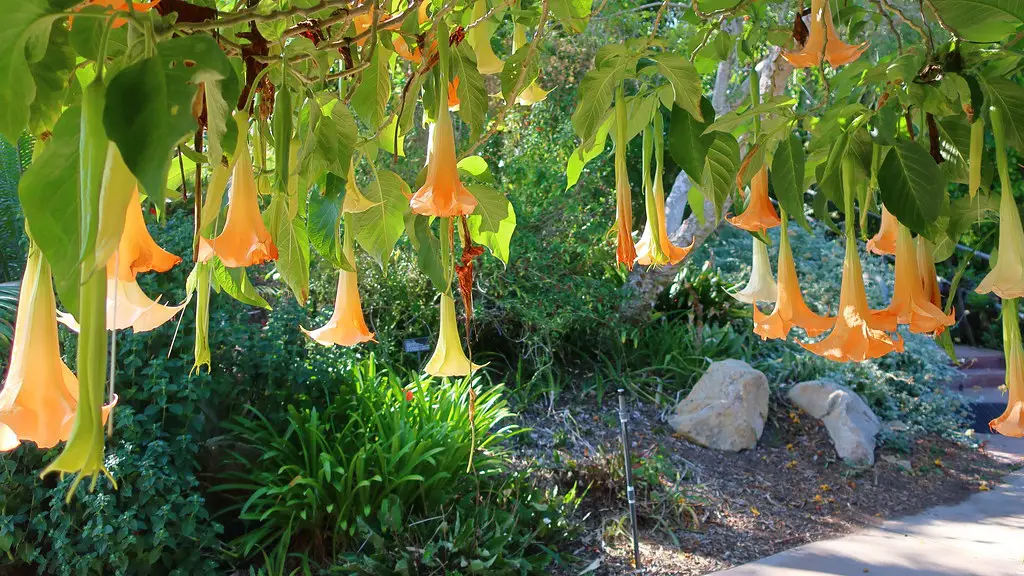Angel Trumpet, known for its stunningly large, trumpet-shaped flowers, is a captivating plant that beckons attention. Its blooms hang downward, producing a unique spectacle, and often fill the air with a delightful fragrance. Belonging to the genus Brugmansia, the Angel Trumpet’s blooms come in various shades such as white, yellow, pink, and orange.
Despite its celestial name and mesmerizing appearance, Angel Trumpet has a darker side. All parts of the plant are highly toxic if ingested, containing compounds that can lead to severe health issues or even death. This fact adds an element of mystique and caution to its cultivation.
Native to South America, Angel Trumpet has become a popular ornamental plant in gardens worldwide, appreciated for its ornate flowers and ability to attract pollinators like hummingbirds and moths. However, care must be taken in planting and maintaining this intriguing species.
| Attribute | Details |
|---|---|
| Common Names | Angel Trumpet |
| Botanical Name | Brugmansia |
| Family | Solanaceae |
| Plant Type | Shrub or small tree |
| Mature Size | 6-20 feet tall |
| Sun Exposure | Full sun to partial shade |
| Soil Type | Well-draining, rich, loamy soil |
| Hardiness Zones | 9-11 |
| Native Area | South America |
Angel Trumpet Care
Caring for Angel Trumpet can be an enriching experience for the garden enthusiast. The plant’s striking appearance is sure to become a focal point in any garden setting. Proper care, including attention to sunlight, water, soil, and regular feeding, will reward the grower with spectacular, fragrant blooms.
Despite its beauty, it is vital to handle Angel Trumpet with care, as all parts of the plant are toxic. Gardeners should be cautious, particularly if children or pets frequent the garden area.
Light Requirement for Angel Trumpet
Angel Trumpet thrives in full sun to partial shade. While it can grow in various light conditions, providing abundant sunlight will ensure robust growth and prolific blooming. In regions with intense sun, some afternoon shade might be beneficial.
Soil Requirements for Angel Trumpet
Angel Trumpet prefers well-draining, rich, loamy soil. The soil should retain moisture without becoming waterlogged. Adding organic matter or compost can enhance soil quality, promoting healthy growth and abundant flowering.
Water Requirements for Angel Trumpet
Regular watering is essential for Angel Trumpet, particularly during the growing season. The soil should remain moist but not soggy. Drought conditions may cause stress, leading to reduced blooming and overall vitality.
Temperature and Humidity
Angel Trumpet prefers warm climates, thriving in USDA hardiness zones 9 to 11. While the plant can tolerate some cool temperatures, frost will cause significant damage. In cooler zones, consider growing Angel Trumpet in a container that can be brought indoors during the winter.
Fertilizer
Feeding with a balanced fertilizer promotes vigorous growth and flowering. Fertilize regularly during the growing season, following the manufacturer’s recommendations. Organic options like compost or well-rotted manure can also nourish the plant.
Pruning Angel Trumpet
Pruning is essential to maintain the desired shape and encourage branching. Regular pruning can stimulate flowering and remove any dead or diseased parts. Pruning can be done in late winter or early spring when the plant is dormant.
Propagating Angel Trumpet
Angel Trumpet can be propagated from cuttings taken in spring or early summer. Place the cuttings in a soilless medium and keep them moist until they root, usually within a few weeks.
How To Grow Angel Trumpet From Seed
Growing Angel Trumpet from seed is possible but requires patience. After collecting seeds from mature pods, sow them in a well-draining medium and keep them warm and moist. Germination can take several weeks.
Common Pests & Plant Diseases
Spider Mites
Regularly inspect and treat with insecticidal soap if needed.
Root Rot
Prevent by ensuring well-draining soil and proper watering.
Common Problems With Angel Trumpet
Wilting Leaves
Often caused by underwatering or poor soil conditions. Adjust care accordingly.
Lack of Blooms
May result from inadequate sunlight or improper fertilization. Assess and modify as needed.
Pro Tips
- Plant Angel Trumpet near seating areas to enjoy its evening fragrance.
- Always handle with care, wearing gloves if needed, due to the plant’s toxicity.
- Consider container planting for ease of movement and better control over soil conditions.
- Monitor regularly for pests or diseases to ensure a healthy, thriving plant.
- Pair with complementary plants like ferns or ornamental grasses for a visually appealing garden display.

